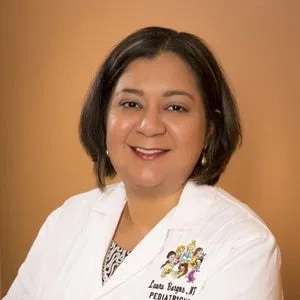ADD vs ADHD
ADD and ADHD have become two popular diagnoses. All children can be energetic and easily distracted, so do all children suffer from ADHD?
Well, the answer is no. It’s true that most children have high energy levels and are usually unable to focus their attention for a long period, but as they grow older, they will develop their faculties of focus and self-control. However, when the child’s hyperactivity or inattention becomes a source of problems and suffering for them or their family, it’s time to consult a specialist.
The doctors at Pediatrics of Sugarland are fully qualified to not only diagnose ADHD, but to also help the child and their family successfully deal with this condition. Contact us today to book your appointment.
Entrust your child’s health to our team of seasoned pediatricians at Pediatrics of Sugar Land. We offer comprehensive care tailored to your child’s unique needs. Schedule a visit today and experience our commitment to compassionate and knowledgeable pediatric care.
Choose Color
What is ADHD?
ADHD, formerly known as ADD, is a neuropsychiatric disorder commonly diagnosed in children. In many cases, however, ADHD can go unnoticed during childhood and only be diagnosed when the person becomes an adult.
ADHD stands for Attention deficit hyperactivity disorder. And as the name entails, it includes to varying degrees, symptoms of hyperactivity, high energy levels, impulsivity, and difficulty maintaining focus.
What causes ADHD
The exact cause of ADHD is unknown. Since ADHD is a neurodevelopmental disorder, it is thought to be caused by a variety of factors. Such factors can be internal and are associated with genetics, drug use or certain deficiencies during pregnancy, or other external factors such as the child’s diet and environment.
What are the most common symptoms of ADHD?
The symptoms of ADHD generally fall into one of these (or all three) categories:
– Impulsive:
These children tend to act before thinking. They are usually impatient, may exhibit intense emotional reactions, and may interrupt, or be verbally or physically aggressive towards other children.
– Hyperactive:
These children have very high energy levels. They are restless and easily bored. They may disrupt the class because they find it hard to stay in place and remain quiet.
– Inattentive:
These children are easily distracted and have trouble keeping their attention on a task for a long period. They have trouble focusing, are seen as daydreamers, absent-minded, or not detail-oriented.
These symptoms may be noticed by the parents, or in a school setting by a teacher or a childcare provider, hence the importance of healthy communication with the school staff and of regularly checking up on how well a child is performing at school.
If ADHD is suspected, it’s necessary to seek the help of a professional to make a formal diagnosis.
ADHD Medication
How is ADHD formally diagnosed?
A doctor, preferably a pediatrician or child psychiatrist, will be able to make a diagnosis.
To diagnose ADHD, the doctor will interview the parents, asking about their child’s functioning, their behavior, and when these symptoms started. Checklists may be handed out for the parents and the teachers to complete.
The doctor may perform a general physical examination to make sure that the child is healthy and there are no underlying conditions causing these symptoms.
The doctor will also look for signs of other neuropsychiatric conditions like anxiety disorders, oppositional and defiant behaviors, or learning disorders like dyslexia, which are frequently mistaken for ADHD.
How is ADHD treated?
Many therapeutic tools are available to successfully manage ADHD in children.
– Medicine:
Certain drugs are commonly prescribed to help the brain slow down and focus better, thus alleviating the symptoms of ADHD.
– Therapy:
Certain types of therapy can improve the behavior, as well as the social and emotional skills of children with ADHD.
– School support programs:
Keeping a healthy line of communication with the school staff is necessary. It will help the children enjoy the school more and will make the teachers more aware of the child’s limitations.
– Family support programs:
Coaching programs are available for the parents, and they will teach them specific skills necessary to deal with children suffering from ADHD.
What are the best lifestyle tips to help children with ADHD?
There are no scientific studies that directly support the claim that certain lifestyle practices may improve or worsen ADHD. However, many families have reported that factors such as diet and screen time affected their child’s ADHD symptoms.
– Screen time:
Although increased screen time is not directly linked to the development of ADHD, many studies have found that the more time pre-school children spent on screens and phones, the more they displayed symptoms like increased hyperactivity, and difficulty maintaining focus. It’s logical then to want to limit screen time in young children, especially those already displaying symptoms of ADHD.
– Nutritional approaches:
Contrary to popular belief, sugar doesn’t cause ADHD in children. However, foods and beverages that are high in sugar give children excessive energy, which can mimic or worsen symptoms of ADHD. As a result, minimizing foods high in sugar like processed cakes and cookies, energy drinks, as well as candy is a necessity to help children with ADHD be calmer and make their symptoms easier to manage.
Another possible dietary tool is the oligo-antigenic diet. There is no scientific consensus on the efficacy of this diet yet, but some studies have reported that consuming a diet low in common allergens (like cow’s milk, wheat, eggs, shellfish, and peanuts) has improved ADHD symptoms in children.
Pediatrics of Sugar Land at 2343 Town Center Dr #2 is located in Sugar Land, the largest city in Fort Bend County, Texas. Situated in the Houston metropolitan area, this populous suburban municipality is approximately 19 miles southwest of downtown Houston. It’s conveniently positioned near the junction of Texas State Highway 6 and Interstate 69/U.S. Route 59. The city boasts various neighborhoods such as Plantation Colony, Sugar Creek, and Colony Meadows, among others.
Are ADHD and ADD permanent?
ADHD and ADD, which are attention deficit disorders, can vary in their long-term impact on individuals. While these conditions are chronic and typically last throughout a person’s life, they are not necessarily permanent. The maturation of the prefrontal cortex, which occurs as a child grows and develops, may lead to a reduction or complete resolution of the symptoms and side effects associated with ADHD and ADD.
Research suggests that about one-third of adults who experienced ADHD and ADD during childhood no longer face these challenges in adulthood, or their symptoms become significantly less severe. This indicates that as the prefrontal cortex matures, individuals may develop improved self-regulation and attention abilities, leading to a reduction in ADHD and ADD symptoms.
It is important to note, however, that not everyone with ADHD or ADD will experience the same outcome. For some individuals, the symptoms persist well into adulthood and may require ongoing management and treatment. Factors such as the severity of the initial diagnosis, the availability of appropriate interventions, and individual coping strategies can influence the long-term impact of these disorders.
Therefore, while ADHD and ADD are typically considered chronic conditions, the likelihood of long-term impacts can vary among individuals. The maturation of the prefrontal cortex and other factors such as interventions and coping strategies play a crucial role in determining whether the symptoms of ADHD and ADD will persist or diminish over time.
Pediatrics of Sugar Land New Location:
Pediatrics of Sugar Land at 2343 Town Center Dr #2 is located in Sugar Land, the largest city in Fort Bend County, Texas. Situated in the Houston metropolitan area, this populous suburban municipality is approximately 19 miles southwest of downtown Houston. It’s conveniently positioned near the junction of Texas State Highway 6 and Interstate 69/U.S. Route 59. The city boasts various neighborhoods such as Plantation Colony, Sugar Creek, and Colony Meadows, among others.
Pediatrics of Sugar Land
Your treatment plan is designed for steady progress, with every phase promptly implemented.
Services
- ADD / ADHD
- Adolescent Care
- Allergies Care
- Asthma Care
- Autism Screening and Diagnosis
- COVID-19 Care
- Dietary and Nutrition
- Earache Care
- Fever Care
- Immunizations
- Lab Testing
- Newborn Care
- Pediatric Weight Management
- Prenatal Visits
- Preventive Health
- School and Sports Physicals
- Throat Pain
- Vaccination
- Vision and Hearing Services
- Well Child Exam






















